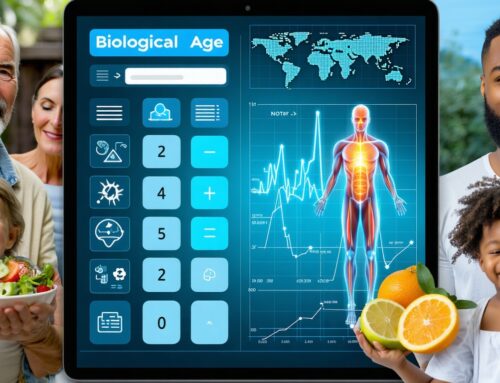Understanding Biological Age
Biological vs. Chronological Age
Let’s chat about age, shall we? There’s the age you celebrate with cake and candles—your chronological age. It’s just the number of years you’ve been around, plain and simple. But then there’s your biological age, which is a bit more like a health report card. It looks at how your body is holding up, considering things like your lifestyle, genes, and the environment you live in.
Think of biological age as a reflection of your body’s real-time condition. It’s why one 40-year-old might feel spry and energetic, with a biological age of 30, while another might feel worn out, with a biological age of 50. Specifically, this idea is key to figuring out how to stay healthy and live longer.
Curious about how these two ages stack up? Check out our article on biological age vs chronological age.
Factors Influencing Biological Age
So, what makes your biological age tick? A bunch of things, really—like how you live, what you’re exposed to, and your genetic makeup. Therefore, here’s a quick rundown:
- Exercise: Getting your sweat on regularly can keep your weight in check, boost your heart health, and fend off long-term illnesses, all of which can shave years off your biological age. Want the scoop on how exercise helps? Visit biological age and exercise.
- Diet: Eating a diet full of nutrients, low in junk, and easy on the sugar can do wonders for your biological age. Good food keeps your cells happy and inflammation at bay. Dive into the details at biological age and diet.
- Smoking: Lighting up speeds up aging by stressing out your cells and tissues. Smokers often find their biological age creeping up faster than non-smokers. Learn more at biological age and smoking.
- Stress: Being stressed out all the time can mess with your hormones and ramp up inflammation, both of which can age you faster. Chill out with some yoga or meditation to keep your biological age in check. More on this at biological age and stress.
- Sleep: Catching quality Z’s is crucial for fixing up your cells and staying healthy. Skimping on sleep can make your biological age climb. Get the lowdown at biological age and sleep.
- Environmental Factors: Breathing in pollutants or coming into contact with harmful chemicals can speed up aging. As such, cutting down on these exposures can help keep your biological age lower. Check out biological age and pesticides and biological age and plastics.
| Factor | Impact on Biological Age |
|---|---|
| Regular Exercise | Decreases |
| Balanced Diet | Decreases |
| Smoking | Increases |
| Chronic Stress | Increases |
| Poor Sleep | Increases |
| Environmental Toxins | Increases |
By getting a handle on these factors, you can take charge of your biological age. For a deeper dive into figuring out your biological age, head over to our guide on how to calculate biological age.
Impact of Lifestyle on Biological Age
Your lifestyle choices are like the secret sauce to your biological age. Things like exercise, what you eat, and whether you puff on those cancer sticks can speed up or slow down how fast you age. Knowing how these factors play into your biological age can help you make smart choices to keep your body feeling young and spry.
Exercise and Biological Age
Getting off the couch and moving around is one of the best ways to shave years off your biological age. Regular exercise can pump up your heart health, make your muscles stronger, and just make you feel better all around. According to Healthline, sitting around all day can make your biological age higher than the number of candles on your birthday cake.
| Activity Level | Impact on Biological Age |
|---|---|
| Couch Potato | Adds years to your biological age |
| Moderate Exercise | Keeps you young at heart |
| High-Intensity Exercise | Turns back the clock big time |
Adding activities like yoga, pilates, and regular aerobic workouts can help keep your biological age in check. For more on how exercise can keep you young, check out our article on biological age and exercise.
Diet and Biological Age
Another key point, what you put on your plate can make a big difference in how old your body feels. Eating a balanced diet full of fruits, veggies, whole grains, and lean proteins can help keep your biological age low. But if you’re munching on processed junk, sugar, and greasy foods, you’re speeding up the aging process.
Switching to a plant-based diet and adding some dietary supplements can work wonders for your biological age (CNET). Here are some food choices to think about:
| Dietary Factor | Impact on Biological Age |
|---|---|
| Greasy Foods | Adds years to your biological age |
| Plant-Based Diet | Keeps you feeling young |
| Junk Food | Ages you faster |
| Antioxidant-Rich Foods | Keeps you looking fresh |
For more tips on how your diet can keep you young, check out our articles on biological age and diet and biological age and antioxidants.
Smoking and Biological Age
Smoking is like hitting the fast-forward button on aging. It messes with your body by causing oxidative stress, messing up your DNA, and making it harder for your body to fix itself. According to Healthline, if you’re a heavy smoker, your biological age might be way older than your actual age.
| Smoking Habit | Impact on Biological Age |
|---|---|
| Non-Smoker | Keeps your biological age low |
| Occasional Smoker | Adds a few years to your biological age |
| Heavy Smoker | Ages you a lot faster |
Kicking the smoking habit can have immediate and long-lasting benefits for your biological age. For more info on how smoking affects your biological age, check out our article on biological age and smoking.
By getting a handle on how your lifestyle choices affect your biological age, you can take steps to keep your body feeling young and healthy. For more on how to test your biological age, explore our articles on biological age assessment tools and how to calculate biological age.
Methods for Assessing Biological Age
Figuring out your biological age can give you some real insight into your health and how long you might stick around. There are a few ways to check this out, each with its own perks. Let’s chat about three popular ones: DNA methylation testing, telomere length analysis, and biomarkers evaluation.
DNA Methylation Testing
DNA methylation testing is like the new kid on the block for checking biological age. It looks at chemical tweaks in your DNA, especially those little methyl groups that latch onto your DNA. These changes can give you a clue about how your body is holding up over time (Longevity.Technology).
This test is super precise and paints a pretty clear picture of your biological age. It works on the idea that certain DNA methylation patterns are tied to aging. By checking out these patterns, scientists can guess your biological age with some serious accuracy.
| Test Type | Precision | Cost |
|---|---|---|
| DNA Methylation | High | $$ |
Want to know more about how to figure out your biological age with DNA methylation? Check out our article on how to calculate biological age.
Telomere Length Analysis
Telomere length analysis is another go-to for checking biological age. Telomeres are like little caps on the ends of your chromosomes that get shorter as you get older. Shorter telomeres usually mean a higher biological age (Longevity.Technology).
This test checks how long your telomeres are to guess your biological age. It’s based on the idea that telomere shortening is a sign of cellular aging. By measuring telomere length, scientists can give you an estimate of your biological age.
| Test Type | Precision | Cost |
|---|---|---|
| Telomere Length | Moderate | $ |
For more on how biological age and telomeres are connected, take a look at our article on biological age and telomeres.
Biomarkers Evaluation
Biomarkers evaluation is all about looking at different markers in your body, like proteins and hormones, to figure out your biological age. This method gives a full picture of your biological age by checking out multiple aging indicators.
Biomarkers evaluation can give you a broad view of your biological age, considering various factors that affect aging. It’s a flexible method that can be adjusted to fit your health needs.
| Test Type | Precision | Cost |
|---|---|---|
| Biomarkers Evaluation | Variable | $ |
For more info on tools for assessing biological age, visit our article on biological age assessment tools.
By checking out these different ways to assess biological age, you can pick the one that fits you best. Whether you go for DNA methylation testing, telomere length analysis, or biomarkers evaluation, knowing your biological age can help you make smart choices about your health and how long you might live.
Advanced Biological Age Testing
Glasgow-Karolinska Clock
The Glasgow-Karolinska Clock is a fancy gadget cooked up by some brainy folks in Europe. It’s like a magic mirror for your insides, telling you how old you really are, not just what your birth certificate says. This clock is a whiz at checking out both the good and not-so-good bits of your body. It looks at DNA methylation, which is a fancy way of saying it checks out the little chemical tweaks in your DNA that can be influenced by what you eat and the tiny critters living in your gut (Longevity.Technology).
DNA methylation is the hot topic in figuring out how fast you’re aging. It’s like reading the tea leaves in your DNA to see how your body’s holding up. The Glasgow-Karolinska Clock is super precise, giving you the lowdown on your biological age.
| Feature | Description |
|---|---|
| Accuracy | Spot-on in measuring biological age |
| Tissue Compatibility | Works on both the good and the bad stuff |
| Influencing Factors | What you eat, your gut buddies, and how you live your life |
Curious about how to figure out your biological age? Check out our article on how to calculate biological age.
Predicting Age-Related Diseases
Biological age testing isn’t just about numbers; it’s like having a crystal ball for your health. By checking out various biomarkers, it can give you a heads-up on potential health hiccups before they even start. Knowing your biological age lets you take charge and dodge those health curveballs.
As we get older, DNA methylation patterns do a little dance, and these moves can hint at the chances of getting age-related diseases. For instance, some genes might get a bit too chatty due to these changes, leading to stuff like heart disease or diabetes (CNET).
| Biomarker | Disease Prediction |
|---|---|
| DNA Methylation | Heart disease, diabetes |
| Telomere Length | Cancer, Alzheimer’s |
| Inflammatory Markers | Chronic inflammation, autoimmune issues |
Want to dive deeper into how biological age ties into living longer? Check out our article on biological age and longevity.
By using cool tools like the Glasgow-Karolinska Clock and checking out biomarkers, you can get a better grip on your health and steer clear of age-related troubles. For more info on biological age assessment tools, swing by our page on biological age assessment tools.
Accelerated Aging in Testing
Environmental Stress Testing
Accelerated aging is like putting your product through boot camp, pushing it to its limits to see how it holds up over time. This isn’t just about watching paint dry; it’s about using science to fast-forward the wear and tear. Depending on what you’re testing, you might use:
- Temperature cycling (think of it as a sauna and freezer combo)
- Thermal shock (sudden temperature changes that make your product go “Whoa!”)
- Humidity testing (like a tropical vacation, but for your product)
- UV exposure (sunbathing without the sunscreen)
- Oxygen and pollutant exposure (city smog simulation)
- Salt spray test (a day at the beach, minus the fun)
- Dust testing (desert storm conditions)
- Mechanical stress testing (shake, rattle, and roll)
- High-speed operation (pedal to the metal)
- Vibration testing (earthquake simulation)
- Chemical stability testing (chemical cocktail party)
- Thermal aging (slow roast)
- Chemical exposure (acid rain, anyone?)
- Combined stress testing (all of the above, at once)
These tests are like a crystal ball, helping you predict how your product will age in the real world, but in a fraction of the time (Wikipedia).
Applications in Various Industries
Accelerated aging is the secret sauce for industries that need to know if their products will stand the test of time. Here’s how different sectors use it:
Pharmaceuticals and Medical Devices
In the world of pills and medical gadgets, accelerated aging is a big deal. It’s all about making sure drugs and devices don’t go bad before their time. Stability testing follows the rules set by the International Council for Harmonisation (ICH) Q1A(R2), which is like the recipe for testing drugs under hot and sticky conditions. For medical devices, packaging validation (ASTM F1980) checks that the sterile barrier stays strong (Wikipedia).
| Industry | Application | Testing Standard |
|---|---|---|
| Pharmaceuticals | Stability Testing | ICH Q1A(R2) |
| Medical Devices | Packaging Validation | ASTM F1980 |
Electronics
Electronics are put through the wringer with accelerated aging to see if they can handle the heat, shakes, and electrical overloads. Tests like HALT and HASS are the go-to for spotting early failures. Standards like IEC 60068-2 lay down the law for testing electronic gadgets (Wikipedia).
| Industry | Application | Testing Standard |
|---|---|---|
| Electronics | Reliability Testing | IEC 60068-2 |
Automotive and Aerospace
Cars and planes face accelerated aging to prove they can survive the wildest conditions. These tests are crucial for making sure vehicles and aircraft stay safe and sound, no matter what Mother Nature throws their way.
| Industry | Application | Testing Standard |
|---|---|---|
| Automotive | Material Durability | Various |
| Aerospace | Component Performance | Various |
Consumer Goods
From your trusty toaster to your favorite shampoo, consumer goods get the accelerated aging treatment to ensure they last and perform as promised. Manufacturers use these tests to guarantee their products are worth every penny.
| Industry | Application | Testing Standard |
|---|---|---|
| Consumer Goods | Product Longevity | Various |
Library and Archival Preservation
In the world of books and old documents, accelerated aging helps speed up the natural aging process of materials like paper. By exposing them to extreme conditions, we can predict how they’ll hold up over time. Therefore, it’s like a time machine for preservation science (Wikipedia).
| Industry | Application | Testing Standard |
|---|---|---|
| Library and Archival | Material Preservation | Various |
Understanding accelerated aging is key to ensuring products last and perform across industries. For more on biological age testing, check out our articles on biological age calculator and biological age assessment tools.
Future of Biological Age Testing
DNA Age Tests
DNA age tests are like a sneak peek into your body’s clock, showing how you’re aging compared to your buddies. These tests check out specific bits in your DNA to spill the beans on your health and how long you might stick around. While they won’t tell you the exact day you’ll kick the bucket, they do give you a heads-up on your health journey.
Also, mixing DNA age test results with other health check-ups can paint a fuller picture of your well-being. Imagine throwing in AI’s take on your heart and eye health with DNA age tests for a more rounded view. Don’t forget to factor in stuff like blood pressure, sugar levels, and cholesterol for a better guess at your lifespan.
| Test Type | Key Features | Insights Provided |
|---|---|---|
| DNA Age Test | Checks DNA markers | Biological age guess, health path |
| AI Health Assessment | Heart and eye health | All-around health check |
| Clinical Variables | Blood pressure, sugar, cholesterol | Full health picture |
Curious about figuring out your biological age? Swing by our guide on how to calculate biological age.
MetaboAgeMort and Mortality Prediction
Accordingly, MetaboAgeMort is like a crystal ball for your health, using metabolic clues to guess your biological age and spot age-related issues. By digging into various biomarkers, MetaboAgeMort gives you a detailed snapshot of your metabolic health and how long you might hang around.
The hunt for markers that measure biological aging has ramped up lately. Scientists want to use these markers to predict aging outcomes and as stand-ins for treatments that boost healthy aging and longevity. But there’s still a lot of debate on how these markers should be checked out before hitting the doctor’s office.
| Biomarker | Purpose | Insights Provided |
|---|---|---|
| Metabolic Biomarkers | Measure biological aging | Metabolic health, longevity guess |
| Clinical Biomarkers | Blood pressure, sugar, cholesterol | Health check, disease forecast |
For more scoop on biological age assessment tools, peek at our article on biological age assessment tools.
While DNA age tests and MetaboAgeMort offer cool insights, remember there’s no magic potion for aging gracefully. A mix of good habits like regular workouts, munching on Mediterranean-style grub, catching enough Z’s, and keeping up with pals is linked to living longer. Scientists are still digging into how tweaks like diet changes, exercise, stress-busting, or meds can slow down the aging process.
Want to know how lifestyle choices affect your biological age? Check out our articles on biological age and diet and biological age and exercise.







